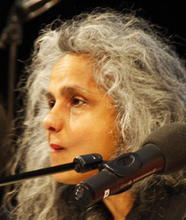Mis/Understanding: the agonistic and integrative role of dissent in social
In this presentation I would like to explore Misunderstanding from a multidimensional lens within a nesting of overlapping contexts. I want to do this in two ways first I want to foreground a few life issues impacting us all whether we are funders, creators, agents or presenters. I then want to approach these issues from 3 simple metaphors: Planet, Body and Mind. Perhaps there is a slim correlation of these metaphors with the three threads of this Conference of Art, Economy and Policy.
At its most basic level as we all know misunderstanding is about poor communication skills and not listening, the image of two people standing in front of each other but looking past each other: not seeing, not attentive, not curious, not generous, not open. Where are our misunderstandings coming from? Is it from imbalanced power relations, dominant mindsets, ignorance, different objectives, lack of recognition, complacency, different cultural codes and stereotypes or preconceived ideas?
On the structural side we cannot discuss misunderstanding without having a critique of centrism and acknowledging existing relations of power in society. Much of what is leading us to misunderstand each other on a global scale is based in the unquestioned assumptions of rigid or dominant worldviews:
a singular approach to contemporary aesthetics, a hierarchical privileging of single schools of thought. The counterpoint to this narrowly reductive hierarchy is that once diverse perspectives or cultures come into symmetrical play a mutual and reciprocal relativization emerges where all should be able to perceive the limitations of their own social and cultural worldview. While this may be unsettling to habitual vanities it is a long overdue nod to historical transparency, rituals of restoration and co-evolution. As well within institutional constructs what are the metaphorical and experiential conditions that nurture ease in crossing boundaries, appreciating difference and in recognizing the situational fluidity and historical plurality in ones own identity and affinities.
On the cultural front misunderstanding can also be seen as a prerequisite to understanding because of the continuously unfolding nature of human relatedness and the cultural processes we are rooted in. Do we fully appreciate that our linguistic structures are systems of behaviour? The dialogic dynamic of language between centring and decentring, context and recontextualization transforms and engenders the sharing of new meanings and subverts mutually tolerated routines of avoidance.
Being open to cultural difference entails the inherent risk of radical transformation of the language and structures by which we recognize ourselves. We risk losing the vision of ourselves in the mirror of our cultural organizations and ministries. But perhaps the risk to being open to the views and sites of "others" is the ethical origin of democracy. (1)
At the political level, it is necessary that there be provision for a public sphere for agonistic and creative dialogue that is more than episodic and virtual. What is also needed are new political models that confront the social relations of power and therefore propose constitutive components to ground poly-vocal debates on recognized fundamentals of interdependence and a human rights framework that limits, maintains and allows for the expression of cultural differences. A complex multidimensional framework that is dynamic, that works to balance and regulate individual human rights, minority rights, majority rights and the rule of law. It should be a system that is explicit about give and take, mutual obligations and sharing.
At the level of the creative individual we need only start with ourselves to recognize the fragile complexity of our interdependence and rootedness in the tissue of human relationships. In order to deepen the democratic project, metaphorical imaginations are essential to making empathetic connections and communicating experiences that others do not share. Across-the species abilities to communicate and reach mutual understanding with the aim, as Bauman puts it, of knowing how to go on, but also knowing how to go on in the face of others who may go on - have the right to go on - differently. (2)
See also the opening speech by Sharon Fernandez


